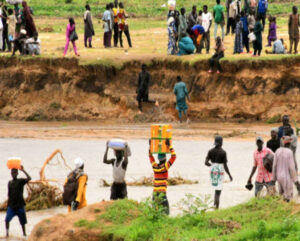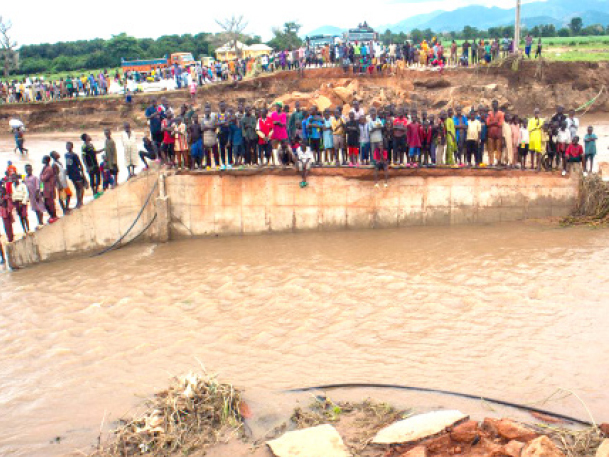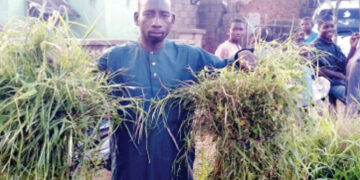Just a week after the collapse of Waga Bridge, a vital connector between Adamawa and Borno states, a fresh flood has claimed the lives of five individuals, including an elderly woman, and inundated five communities.
Residents of Adamawa and Borno states are facing significant hardships following the collapse of the Waga Bridge, a critical infrastructure that connects both states and facilitates the movement of people and goods.
This incident has severely disrupted transportation and commerce, leaving many individuals stranded, particularly commuters and traders who relied on this route for their livelihoods.
The situation has been further exacerbated by recent floods caused by heavy rainfall , leading to widespread damage and displacement. Many homes have been completely submerged, with residents recounting harrowing experiences of fleeing to tree tops with their families, watching their belongings float away.
Sadly, in the midst of these challenges, local divers are stepping in to capitalise on the circumstances.
Though their expertise serves multiple purposes: assisting in rescue and recovery operations for stranded residents, helping to retrieve lost belongings from the floodwaters, or even engaging in salvage operations for vehicles and goods trapped in the flooded areas. The ugly situation has to a large extent, presented them with a unique opportunity to potentially generate income .

The executive secretary of the Adamawa State Emergency Management Agency (ADSEMA), Mrs. Celine Kwamoti Laori, alongside Musa Shashi, the chairman of Madagali local government area, shared the harrowing experiences of the affected residents with LEADERSHIP Weekend.
They confirmed the loss of five lives and reported that 649 homes were destroyed, along with significant livestock casualties and flooded farmlands. In response, the state government has set up eight temporary camps to accommodate the displaced individuals.
Eyewitnesses said the flood , which originated from the Mandara mountains near the Cameroon border, triggered by intense rainfall lasting around four hours, caused devastating impacts in the communities of Palam, Shuwa, Kirchinga, Mayobani, and Kanklia.
A resident of Palam, James Olam, told our correspondent that his home was completely submerged, leading to the loss of his house, food supplies, and all personal belongings. “The flood came on so suddenly, like an earthquake. I’ve never witnessed such flooding in my life,” he shared.
“The volume of water that rushed into our homes that night was unimaginable. We had to climb to the tops of trees with our families, helplessly watching our possessions float away,” he lamented.
Motorists, commuters, and traders from both Borno and Adamawa were also trapped, leaving many others stranded due to the bridge being cut off. Trailers, trucks, and buses loaded with livestock, goods, and passengers had to turn back due to the impassable route.
Furthermore, vehicular movement was halted as makeshift footpath diversions, created since the bridge closure on August 15, 2024, were also washed away by the flood.
LEADERSHIP Weekend has observed that the absence of ferry services has severely impacted stranded commuters, exacerbated by the presence of only a makeshift passage facilitating the crossing of the river until the collapsed bridge can be rebuilt.
Further investigations by our correspondent revealed that families with pregnant women in labour and the ill in the affected communities face critical challenges in accessing healthcare facilities, particularly during nighttime.
They arrested to the fact that local divers exploit the desperate situation, charging exorbitant fees—up to N1,000 per individual—for crossing the flooded river. A local resident, Darambi Stephen, highlighted the issue, stating that these charges are burdensome for those who need to cross.
Another resident from Madagali, Ardo Shehu, lamented that his community and those in Northern Borno are already enduring immense hardship, with prices for commodities skyrocketing as transportation increasingly requires hiring laborers to carry goods across the river.
The collapse of the bridge has also disrupted military operations against insurgency, hindering security agencies’ ability to reach people with urgent needs.
The district head of Duhu, Mustafa Mohammad Sanusi, who also suffered losses due to the flooding, called for immediate intervention in providing medicine, water, and relief materials for flood victims. He reported that over 1,000 farmlands have been devastated, with crops such as maize, guinea corn, cassava, and beans destroyed.
Council chairman Mr. Shashi echoed the call for assistance from both federal and state governments, urging the North East Development Commission (NEDC) to act swiftly in rebuilding the collapsed bridge. He expressed concerns over potential disease outbreaks due to the flooding and appealed to all levels of government for support.
In his response, the commissioner for Reconstruction, Rehabilitation, Reintegration, and Human Services, Barr. Bello Hamman Diram, assured that prompt interventions would be initiated once the report on the flooding was submitted to the ministry.
According to him, data from the Adamawa State Emergency Management Agency (ADSEMA) will guide the resettlement and rehabilitation efforts for the affected individuals.
Earlier, Mrs. Laori, the executive secretary of ADSEMA announced that the government has approved relief materials to address the immediate needs of flood victims. “By today (Friday), the flood victims will receive these relief items. The government is working tirelessly to support all individuals in the eight temporary camps and host communities,” she stated.
Meanwhile, the managing director,Northeast Development Commission (NEDC) Mohammed Alkali, said President Bola Tinubu, approved the reconstruction of the collapsed bridge.
He confirmed that all necessary approvals for the rebuilding have been obtained following an inspection of the damaged bridge. “We are moving forward with this project,” Alkali stated.
The reconstruction of the Madagali Bridge is expected to be a significant undertaking, with delays anticipated due to the recent flooding. Despite the challenges ahead, residents and bridge users are urging for expedited reconstruction to restore normalcy, as recovery from their losses will take time for those affected.
LEADERSHIP writes that as the local population continues to navigate the aftermath of the bridge collapse and flooding, support from government agencies, non-governmental organisations, and the broader community will be essential in addressing the immediate needs for shelter, food, and medical assistance, as well as long-term infrastructure solutions to prevent future disasters.





